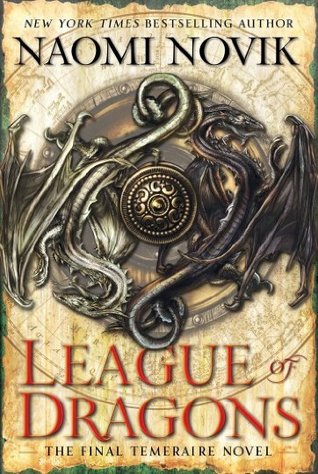Here be dragons
I read a couple of Anne McCaffrey books as a kid, but I was never all that into dragons. I like them when they show up in George R.R. Martin's Song of Ice and Fire — and especially in the HBO Game of Thrones adaptation — but that series is really about the people. Dragons are just a superweapon.

But in Naomi Novik's Temeraire series, dragons are characters and that's the genius of the series. She just wrapped it up with League of Dragons, and she did it well. Fortunately there are nine books in all so if you're feeling bereft about the end of the series you can just start from the beginning again, with His Majesty's Dragon.
I can't really suggest these books for people who are jonesing for Game of Thrones between TV seasons or the much longer wait between books. The better comparison is with Patrick O'Brian's Aubrey-Maturin series — because both are set in the British service during the Napoleonic wars and have a friendship at heart that is the most important in both parties' lives. But Naomi Novik is obviously writing an alternative/fantastical version of history (there are dragons!). So you get fun twists you'll never find in straight-up historical fiction. Like: Some dragons only allow women to be their captains/companions. Napoleon ranges even farther afield — all the way to South America. And most importantly, our protagonists and the society as a whole are forced to wrestle with their treatment of the dragons, many of whom are more intelligent than most people. Temeraire is an exceptional dragon, to be sure, but he is expert at mathematics and speaks multiple languages. And all the dragons are sentient beings, even if they are too often treated like livestock — or convenient weapons.
Really, these books are best suited for anyone who has ever felt strongly connected to an animal, like a dog or a horse. The fantasy isn't so much that there are giant, flying reptiles but that your companion from another species could communicate with you directly — and both delight and exasperate you with his or her idiosyncrasies. Dragons, in Novik's world, are imprinted on the first human who harnesses them and will do everything in their considerable powers to protect that person. Many are intelligent, though they have a weakness for treasure, especially the shiny kind.
That consideration of how dragons should be treated within society as a whole is really the heart of this series, and what elevates it above just another fantasy ... with dragons. Though it may have inspired me to give Anne McCaffrey's books another look (it's been more than 30 years). And also to finish the Aubrey-Maturin series, which I have been drawing out for well over a decade now.







